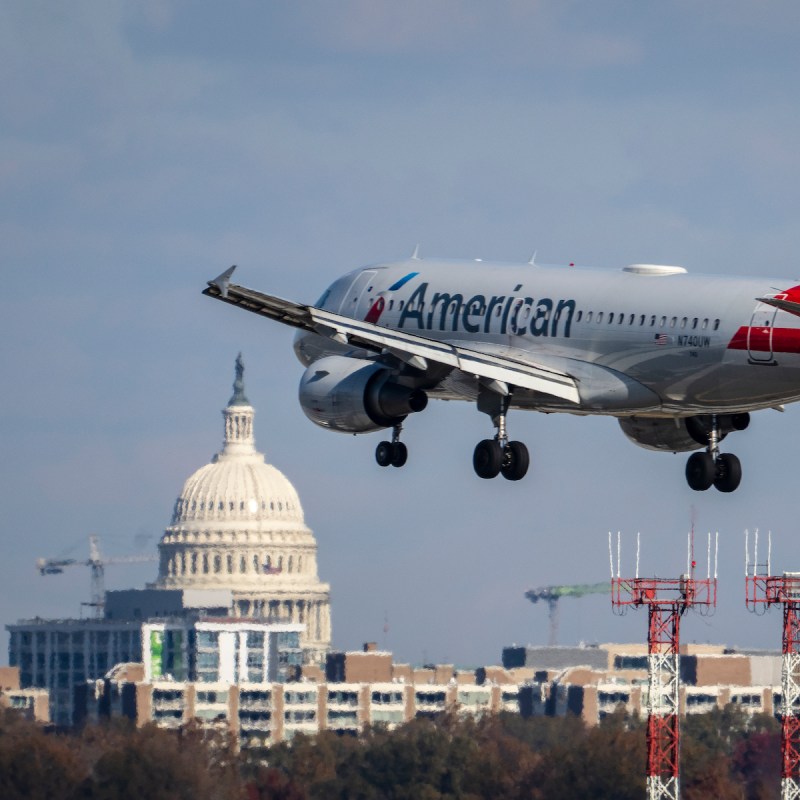
The airline trade group is in full opposition to the Credit Card Competition Act (CCCA), legislation that aims to reduce credit card processing fees. Although the bill largely pits banks against retailers, Airlines for America argues that if the bill passes, it will eliminate travel reward programs for customers.
Videos by TravelAwaits
Marli Collier, the A4A communications manager, told TravelAwaits that because the bill targets interchange fees — the 2% rate that pays for credit card processing — it would destroy the revenue stream airlines use to fund the reward programs.
“Our customers are very passionate about the miles that they earn,” Collier said. “They choose these credit cards specifically so they can get rewarded for spending money they were already planning to spend.”
However, there’s much debate and information circulating online about what the CCCA will do if enacted, so we’re taking a look at what it is and the potential benefits and risks.
What is the Credit Card Competition Act?
The CCCA was filed in June by a bi-partisan group of Senators led by Majority Whip Dick Durbin, a Democrat from Illinois. The group said the goal of the legislation is to “enhance competition and choice in the credit card network market.”
The senators explained that the current market includes four networks: Visa, Mastercard, American Express, and Discover. However, they argue that Visa and Mastercard hold some 83% of the U.S. market, and with their “duopoly,” they impose some of the highest processing fees in the world.
The legislation would address the issue by requiring banks with assets of more than $100 billion to use more than one credit card processor, including one that isn’t Visa or Mastercard. It will also put a cap on processing fees. While the idea is to lower processing fees for retailers, some observers say the benefits for consumers are unclear.
How does the bill affect points?
One of the main criticisms of the bill by groups like the Electronic Payments Coalition, a lobby representing banks and networks and has been leading the charge against the legislation, is that it would jeopardize credit card reward programs such as travel points or cash back.
The EPC argue the regulation would greatly reduce interchange rates — also known as swipe fees — which would pose a problem because they cover processing costs and fund reward programs. They say that’s what happened in 2010 when the Senate passed a similar measure — the Durbin Amendment to the Dodd-Frank Wall Street Reform and Consumer Protection Act — to regulate debit card processing fees. It resulted in the elimination of debit card rewards.
On the other hand, supporters of the bill like the Merchant Payments Coalition argue that rewards will not be affected by the legislation. They explain that banks create reward programs — as opposed to networks — to use as marketing tools to attract customers.
The MPC also argues that the revenue they’ll lose is only a fraction of the profit they will continue to make from swipe fees. In defense of the legislation, supporters say Australia passed similar reforms — despite Visa and Mastercard claiming they would hurt reward programs — but banks continued to offer them.
In an analysis of swipe fees, Investopedia looked at both examples from both the U.S. and Australia. The personal finance website reported two significant effects after implementing debit card regulations in the U.S. First, merchants now pay less in debit card swipe fees, but credit card companies are charging the maximum amount possible. Second, banks beefed up credit card rewards. The website also reported that there were no noticeable effects on the price of goods and services in Australia.
How will it affect the traveling consumer?
Exactly how the Credit Card Competition Act will benefit consumers is unclear. Proponents of the bill argue that merchants will lower prices because they’ll have lower swipe fees, but critics argue that there’s nothing in the bill requiring them to pass the savings onto consumers. They say what’s more likely is that merchants will hoard the profits.
In a white paper about the subject, Julian Morris, a senior scholar at the International Center for Law & Economics, argued that the legislation would likely only benefit credit card networks that aren’t Visa or Mastercard as well as big-box retailers. “Unfortunately, the number and scale of those who lose is likely to be far greater than the number and scale of those who win,” Morris wrote.
Morris described the legislation as causing significant disruption with airline-branded credit cards, which are a steady revenue stream for airlines. He explained that airline companies generate relatively thin profit margins, so they rely on revenue generated from loyalty programs in both good and bad economic times. In fact, most of the major airlines report earning nearly $4 billion in annual revenue from co-branded credit cards. He also explained that cardholders with travel rewards rely on the points and discounts that come with their credit cards and for that reason, the programs are popular.
The potential consequence of the bill, as Morris explained, is that credit card companies may offer fewer benefits and discounts. He also argued that the current networks maintain a high standard of security that third-party networks might not be able to match. He added that while airlines may start offering loyalty programs using different networks, they would need customers to either agree to new terms or switch programs. He called it “a timing mismatch effect.”
“The revenue loss will occur in the short term, while the rewards-redemption effect occurs over a longer time horizon,” Morris said, adding that customers switching programs would immediately interfere with the airlines’ revenue streams and the airlines would lose the loyalty of frequent fliers. In his conclusion, he said: “[A]irlines, in particular, could be adversely affected, leading to reduced fleet investment, termination of routes, and potentially to bankruptcy.”
What’s next for the Credit Card Competition Act?
There’s no clear answer to whether or not the CCCA will pass or when the Senate (or the House) plan to vote on it during the 2023 legislative session. According to GovTrack, a website that records the stages of legislation as it advances through Congress, it’s still listed in the introductory phase. Additionally, unlike previous attempts when it was attached to another bill, the personal finance site NerdWallet reported that the current draft will mostly likely get a standalone vote.
Article updated at 11:53 a.m. Eastern on Nov. 20, 2023
